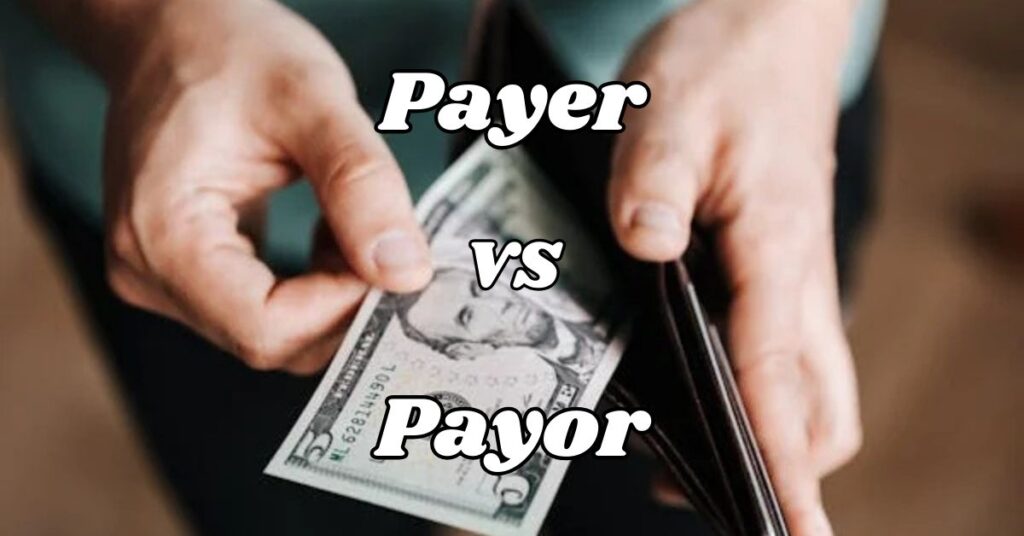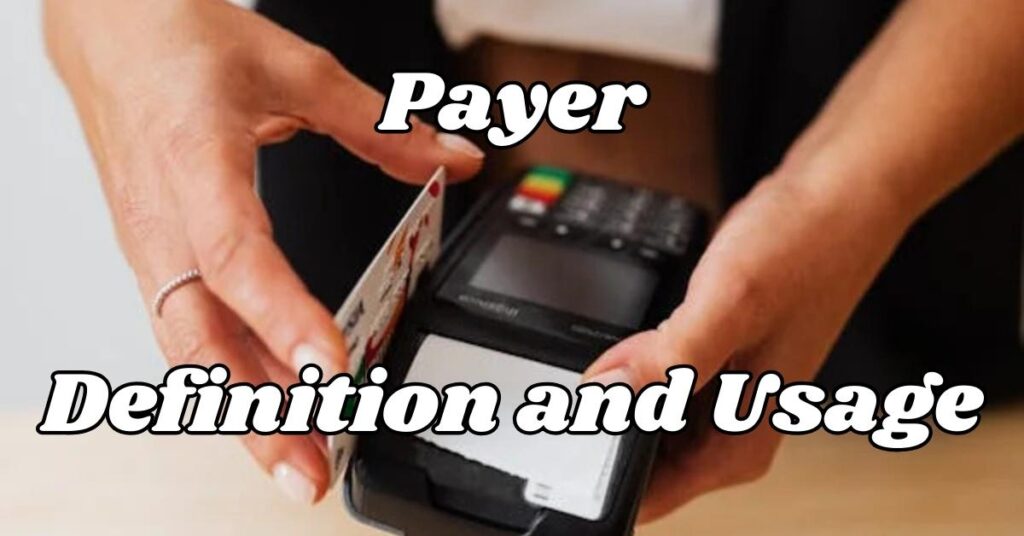Payer vs Payor is a common topic in the world of finance, often causing confusion among individuals and businesses alike. While both terms refer to someone who makes a payment, their usage can vary significantly depending on the context.
Understanding the distinction between these two terms is crucial, especially in formal settings like contracts, healthcare billing, and financial transactions. This knowledge not only enhances clarity in communication but also ensures that all parties involved understand their payment responsibilities.
In this article, we will explore the definitions, origins, and practical uses of payer and payor, helping you navigate through various business transactions with confidence.
Quick Summary
Payer is someone who makes a payment, while a payor is often used in more formal contexts, such as legal documents or healthcare. Both terms refer to the same concept: the individual or entity responsible for sending money in a monetary transaction.
Knowing when to use each term can enhance your clarity in discussions about invoice payments, accounts receivable, and other financial matters.
Understanding Payer vs Payor

The distinction between payer and payor often comes down to context. In everyday language, you’ll likely use “payer” more frequently. It fits well in casual conversations about payments or bills. For example, when discussing who will pay for dinner, you would say, “I’ll be the payer tonight.”
On the other hand, “payor” tends to appear in legal or technical discussions. For instance, in a contract regarding a loan, you might see “the payor agrees to repay the debt.” Understanding these nuances helps ensure effective communication about payment responsibilities.
Origins of the Payer
Payer originated in the late 14th century, referring to a person who pays, initially in the context of wages and later expanding to include taxes by the early 15th century. It comes from the Old French word “paiere,” which is derived from the verb “paier,” meaning “to pay.”
This verb has roots in Latin, specifically from “pacare,” which means “to pacify” or “satisfy.” Over time, the meaning evolved to signify giving what is due for goods or services, a concept that became established in English by the early 13th century.
Payer: Definition and Usage

A payer is defined as an individual or entity that makes a payment to fulfill a financial obligation. This term applies broadly across various contexts, from personal transactions like buying groceries to business dealings involving invoices.
In essence, a payer is anyone who transfers money in exchange for goods, services, or to settle debts, playing a crucial role in the financial exchange process.
Payer Definition
“Payer” specifically refers to the party responsible for making a payment. This could be a consumer paying for a product or a company settling an invoice. Understanding this definition helps clarify roles in different business transactions, ensuring that all parties recognize their payment responsibilities.
Payer Usage
“payer” is commonly used in discussions about payments and invoices. For example, one might say, “The payer must submit their payment by the due date.” This term is versatile and can be applied in various contexts, including billing processes, accounts receivable, and even tax payments.
Uses of Payer in Sentence
- The payer settled the invoice promptly.
- In healthcare, the payer is responsible for covering medical expenses.
- As a payer, you must ensure timely payments to avoid penalties.
- The payer’s details are crucial on financial documents.
- Many payers prefer electronic payment methods for efficiency.
Synonyms of Payer
- Remitter
- Debtor
- Contributor
- Purchaser
- Client
- Customer
- Obligor
- Settler
- Financier
- Sponsor
Payor: Definition and Usage

A payor refers to an individual or entity that is responsible for making a payment, particularly in formal or legal contexts. This term is often used in industries like healthcare and finance, where precise language is essential.
A payor can be an insurance company, a business, or any party obligated to fulfill a payment as outlined in a contract or agreement. Understanding the term “payor” is important for navigating financial transactions and ensuring clarity in payment responsibilities.
Payor Definition
“Payor” specifically highlights the role of the party making a payment under agreed terms. Unlike “payer,” which is more commonly used in casual settings, “payor” appears in formal documents and discussions.
This distinction helps clarify obligations and responsibilities, especially in complex transactions like loans or insurance claims.
Rules For Noun Formation From Verbs
Nouns can be formed from verbs by adding specific suffixes. In the case of “pay,” the addition of the suffix “or” creates “payor,” indicating someone who performs the action of paying.
This rule applies to many English verbs, allowing for clear identification of roles within financial exchanges and enhancing understanding of various transaction types.
Payor Usage
The term “payor” is frequently found in legal documents and formal contracts where clarity about payment obligations is essential. For example, when signing a loan agreement, one might read that “the payor must adhere to all payment terms outlined herein.”
5 Uses of Payor in Sentence
- The payor must sign the agreement before funds are released.
- As a payor, you hold responsibility for all payments due.
- The contract specifies the payor’s obligations clearly.
- Each payor should keep accurate records of transactions.
- The payor’s identity is verified before processing payments.
Side by Side Comparison
To better understand the differences between these two terms, here’s a comparison table:
| Aspect | Payer | Payor |
| Definition | Person making a payment | Person or entity responsible for payment |
| Common Use | General financial transactions | Legal and healthcare contexts |
| Synonyms | Remitter, Client | Remitter, Obligor |
Everyday Usage Examples

Using “payer” and “payor” in everyday conversations can help clarify financial discussions. For instance, you might say, “The payer submitted the invoice on time,” in a casual setting. In contrast, a formal context might require, “The payor is responsible for all payments outlined in the contract.”
Recognizing these examples ensures you communicate effectively, whether discussing personal expenses or formal agreements in business transactions.
Payer Example in Sentence
- The payer received a confirmation email after payment.
- Each payer must comply with tax regulations.
- As a payer, I appreciate transparent billing practices.
- The payer’s role is vital in ensuring smooth transactions.
- Many payers opt for automatic billing to simplify payments.
Payor Example in Sentence
- The payor is liable for any late fees incurred.
- Each payor must provide identification when making large payments.
- The payor’s signature is required on all contracts.
- In disputes, the payor often has to prove payment was made.
- The payor’s responsibilities are outlined in the agreement.
Read More Article: Togather or Together: What’s the Difference?
FAQs: Payer vs Payor
Is it tax payer or payor?
The correct term is “taxpayer,” which refers to an individual or entity that pays taxes.
Is an insurance company a payor or payer?
An insurance company is typically referred to as a “payor” in formal contexts, especially regarding claims and payments.
Who is a payer?
A payer is any individual or entity that makes a payment for goods, services, or obligations.
Is payee the person paying?
No, the payee is the person or entity receiving the payment, while the payer is the one making it.
Is ‘payor’ or ‘payer’ correct?
Both “payor” and “payer” are correct; however, “payer” is more commonly used in everyday language, while “payor” appears in formal contexts.
Conclusion
Understanding the difference between Payer vs Payor is essential for effective communication in financial contexts. While both terms refer to the party responsible for making a payment, their usage varies based on formality and context.
Recognizing when to use “payer” in casual conversations versus “payor” in legal or healthcare settings can enhance clarity and professionalism. By grasping these distinctions, you can navigate financial transactions and payment responsibilities more confidently, ensuring smoother interactions in both personal and business dealings.
Related Post: Lucas’s or Lucas: What’s the Difference?

